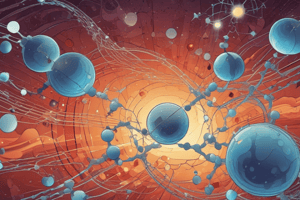Podcast
Questions and Answers
What is the kinetic molecular theory of gases?
What is the kinetic molecular theory of gases?
The kinetic molecular theory of gases states that gases consist of a large number of tiny particles, either atoms or molecules, which are in constant motion and collide elastically with each other and with the walls of the container.
What are the key assumptions of the kinetic molecular theory of gases?
What are the key assumptions of the kinetic molecular theory of gases?
The key assumptions of the kinetic molecular theory of gases are: 1) Gases consist of a large number of tiny particles 2) The particles are in constant random motion 3) The volume occupied by the gas particles is negligible compared to the total volume of the gas 4) The collisions between the gas particles and with the walls of the container are perfectly elastic 5) The average kinetic energy of the gas particles is directly proportional to the temperature of the gas.
How does the kinetic molecular theory explain the properties of gases?
How does the kinetic molecular theory explain the properties of gases?
The kinetic molecular theory explains the properties of gases by stating that the motion and collisions of the gas particles are responsible for the macroscopic behaviors of gases. For example, the high compressibility of gases is a result of the large empty spaces between the particles. The random motion of the particles also explains why gases will mix and diffuse easily. Additionally, the kinetic energy of the particles is directly related to the temperature of the gas, explaining why gases expand when heated and contract when cooled. Overall, the kinetic molecular theory provides a foundation for understanding the behavior of gases at the molecular level.
What are the postulates of the kinetic molecular theory of gases?
What are the postulates of the kinetic molecular theory of gases?
How does the kinetic molecular theory explain the pressure exerted by a gas?
How does the kinetic molecular theory explain the pressure exerted by a gas?
What is the relationship between the temperature and the average kinetic energy of gas particles according to the kinetic molecular theory?
What is the relationship between the temperature and the average kinetic energy of gas particles according to the kinetic molecular theory?
Flashcards are hidden until you start studying




